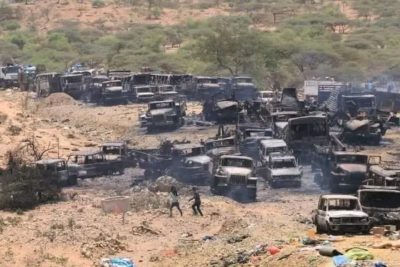
Photo Credit: Sudan Tribune.
The Recent military skirmishes in Fashaga hotly disputed area bring the Horn of Africa, once again, to the headlines, certainly, the headlines of the unpleasant news.
On 22 June, Sudan accused the Ethiopian army of executing 7 soldiers and a citizen in Fashaga.
Subsequently, events escalated rapidly with the visit of General Al-Burhan to the Sudanese military units stationed in the area, where he vowed to display the answer of his troops in the battlefield.
In the fray, Sudan recalled its ambassador from Addis Ababa for consultations, the diplomatic manner of expressing protest. Ethiopia’s ambassador in Khartoum, in turn, promised to convey Sudan government’s concerns over the incident to his seniors. At the same time, Sudan air force launched an attack against Ethiopian units. The picture posted by Sudan Tribune showed a convoy of charred military trucks and 4 wheel-drive pickups, evidently, these vehicles weren’t empty, which means that so many soldiers were killed in the air attack that was instantly followed by intensive shelling from the Sudanese side of the border.
The War of Words
The press releases from the two capitals added fuel to the raging fire. Sudanese army spokesperson initial press release accused the Ethiopian army of killing the Sudanese soldiers ‘inside’ Sudanese territory. The Ethiopian foreign ministry accused the Sudanese army of crossing the border into Ethiopia with the help of terrorist militias thus causing the incident with rival local militias. Each side accuses the other of crossing the border and violating the sovereign territory of the other; this pattern of accusations has been established in all the previous clashes. The mutual mistrust and the repeated violent retaliations not only complicate the situation in the border; but they also create difficulty in determining which side started the conflict.
This problematic fact is plainly reflected in the opposite Ethiopian statement which highlighted that Ethiopia “categorically rejects the misrepresentation of these facts by the Sudanese defense forces that unjustly put the blame on Ethiopia while it was the Sudanese army unit that has crossed into the Ethiopian border provoking the incident.”
The release wished that Sudan de-escalates the situation to avoid unnecessary confrontations. As it has been the case between the two sides, every time this conflict is renewed each side claims that its forces crossed the border and started the aggression. Regularly, Sudan army generals accuse the ‘Ethiopian Army’, which is braced by local militia to be the originator of the skirmishes, whereas Ethiopia confines the skirmishes with Sudanese army to outlawed Ethiopian militias. Promises to defend each country’s territory and crushing any attack from the other side are the standard in every renewed round of conflict.
Diversion of internal Crisis
In its Facebook page, the Sudanese Engineers Association, an ardent anti-coup syndicate questioned the renewed fighting in the border. The Association linked the new round of fighting to the massive demonstration of 30 June in different Sudanese cities. The Association simply asked why the Ethiopian army launches an attack before every anti-coup demonstration. It believes that whenever the generals in Khartoum are faced with such defiant popular uprisings, they try to redirect the crisis by cooking skirmishes in the Eastern borders. Timing of the clashes and the violent Sudanese responses to them are telling. The demonstrators are aware of such stunts. They appear persistent and cautious toward the hype that tries to divert attention from the internal crisis which caused the border fight.
Standby in Eritrea
Fashaga confrontations engaged a vigorous ally of Eritrea: the Amhara ‘Fano’ Militias, the archenemies of the Tigrayan forces. Eritrea is currently busy training and arming these militias. Sudan, aware of these militias’ hostile role in Fashaga, is not happy with the present-day connections. The border skirmishes between Ethiopia and Sudan in whatever level force the Eritrean top generals to take the fitting precautions: put the forces in a tense standby.
Radio Erena resources from Asmara confirmed that the Eritrean Defense Forces divisions are presently engaged in heavy night-training and cross-country marches, locally known as “Egri Go’zou’. The intensive training coincides with rabid roundups in the villages in towns, and recalling of retiring unit members to their posts.
Along with these measures, the Police had released more than 500 prisoners from Adi Abeto prison in Asmara and instantly sent them to the military camps for training.
The renewed clashes in Fashaga, whatever their apparent excuses, are genuine threats to regional peace. In one hand, the hanging border problems give the two parties reasons to start confrontations to avoid protracted internal crises. On the other hand, if the parties capitalize in the crisis, as it is happening now, then the next border war is just around the corner.
By Fathi Osman
